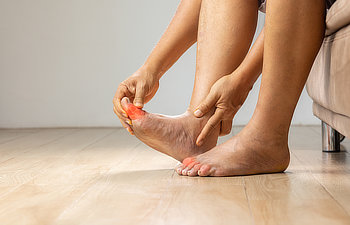Is Your Big Toe Pain Gout?

Big toe pain can be incredibly disruptive, affecting your ability to walk and perform daily activities. One common cause of severe pain in the big toe is gout, a type of arthritis characterized by sudden, intense attacks of pain, redness, and swelling. At the practice of Stuart J. Mogul, DPM, FACFAS, we specialize in diagnosing and treating foot conditions, including gout. Understanding the symptoms, risk factors, and available treatments can help you manage this condition effectively.
What is Gout?
Gout is a form of inflammatory arthritis caused by the accumulation of uric acid crystals in the joints. Uric acid is a waste product formed when the body breaks down purines, substances found in certain foods and drinks. Normally, uric acid is dissolved in the blood and eliminated through the kidneys. However, when the body produces too much uric acid or the kidneys do not excrete it efficiently, it can build up and form sharp, needle-like crystals in the joints, causing gout.
Symptoms of Gout
Gout typically affects the big toe, but it can also occur in other joints, such as the ankles, knees, wrists, and fingers. The symptoms of gout usually appear suddenly and often at night. Common symptoms include:
- Severe Pain: Intense pain in the affected joint, often starting in the big toe. The pain can be excruciating and is usually most severe within the first 12-24 hours of the attack.
- Redness and Swelling: The affected joint becomes red, swollen, and warm to the touch.
- Tenderness: The joint is extremely tender, and even the slightest pressure, such as from a bedsheet, can cause significant pain.
- Limited Mobility: Movement in the affected joint may be restricted due to pain and swelling.
Risk Factors for Gout
Several factors can increase the risk of developing gout:
- Diet: Consuming a diet high in purines, such as red meat, seafood, and alcohol (especially beer), can raise uric acid levels in the body.
- Obesity: Excess body weight increases the production of uric acid and reduces the body’s ability to eliminate it.
- Medical Conditions: Conditions such as high blood pressure, diabetes, kidney disease, and metabolic syndrome are associated with an increased risk of gout.
- Medications: Certain medications, including diuretics (water pills) and low-dose aspirin, can increase uric acid levels.
- Family History: A family history of gout can increase your likelihood of developing the condition.
- Age and Gender: Gout is more common in men than in women, and it typically occurs after menopause in women. Men are more likely to develop gout earlier in life.
Treatments for Gout
At the practice of Dr. Stuart J. Mogul, we offer comprehensive treatment options for gout to help manage symptoms and prevent future attacks. Treatment strategies may include:
- Medications: Anti-inflammatory medications, such as nonsteroidal anti-inflammatory drugs (NSAIDs), colchicine, and corticosteroids, can help reduce pain and inflammation during acute gout attacks. Long-term medications, such as allopurinol and febuxostat, can lower uric acid levels and prevent future attacks.
- Lifestyle Modifications: Dietary changes, weight management, and reducing alcohol consumption can help lower uric acid levels and decrease the risk of gout attacks. Staying hydrated and avoiding foods high in purines are also important.
- Joint Protection: Wearing appropriate footwear and using orthotic devices can help protect the affected joints and reduce pain.
- Regular Monitoring: Regular check-ups with a qualified podiatrist like Dr. Mogul can help monitor uric acid levels and adjust treatment plans as needed.
If you are experiencing sudden, intense pain in your big toe or other joints, it could be gout. Early diagnosis and treatment are essential to managing the condition and preventing complications. At the practice of Stuart J. Mogul, DPM, FACFAS, we are dedicated to providing expert care for patients with gout and other foot conditions. Schedule a consultation today at our NYC office to receive a comprehensive evaluation and personalized treatment plan tailored to your needs. Let us help you take the first step towards relief and improved quality of life.
Posted on behalf of
1111 Park Avenue Suite 1B
New York, NY 10128
Phone: (212) 769-0066
Email: contact@footsurgerycenternyc.com
Monday - Friday 8:30 AM – 6:00 PM
